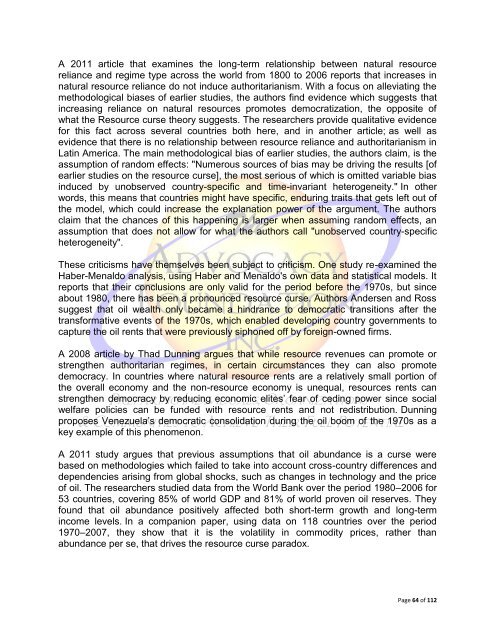De-Industrialization
De-Industrialization
De-Industrialization
Create successful ePaper yourself
Turn your PDF publications into a flip-book with our unique Google optimized e-Paper software.
A 2011 article that examines the long-term relationship between natural resource<br />
reliance and regime type across the world from 1800 to 2006 reports that increases in<br />
natural resource reliance do not induce authoritarianism. With a focus on alleviating the<br />
methodological biases of earlier studies, the authors find evidence which suggests that<br />
increasing reliance on natural resources promotes democratization, the opposite of<br />
what the Resource curse theory suggests. The researchers provide qualitative evidence<br />
for this fact across several countries both here, and in another article; as well as<br />
evidence that there is no relationship between resource reliance and authoritarianism in<br />
Latin America. The main methodological bias of earlier studies, the authors claim, is the<br />
assumption of random effects: "Numerous sources of bias may be driving the results [of<br />
earlier studies on the resource curse], the most serious of which is omitted variable bias<br />
induced by unobserved country-specific and time-invariant heterogeneity." In other<br />
words, this means that countries might have specific, enduring traits that gets left out of<br />
the model, which could increase the explanation power of the argument. The authors<br />
claim that the chances of this happening is larger when assuming random effects, an<br />
assumption that does not allow for what the authors call "unobserved country-specific<br />
heterogeneity".<br />
These criticisms have themselves been subject to criticism. One study re-examined the<br />
Haber-Menaldo analysis, using Haber and Menaldo's own data and statistical models. It<br />
reports that their conclusions are only valid for the period before the 1970s, but since<br />
about 1980, there has been a pronounced resource curse. Authors Andersen and Ross<br />
suggest that oil wealth only became a hindrance to democratic transitions after the<br />
transformative events of the 1970s, which enabled developing country governments to<br />
capture the oil rents that were previously siphoned off by foreign-owned firms.<br />
A 2008 article by Thad Dunning argues that while resource revenues can promote or<br />
strengthen authoritarian regimes, in certain circumstances they can also promote<br />
democracy. In countries where natural resource rents are a relatively small portion of<br />
the overall economy and the non-resource economy is unequal, resources rents can<br />
strengthen democracy by reducing economic elites’ fear of ceding power since social<br />
welfare policies can be funded with resource rents and not redistribution. Dunning<br />
proposes Venezuela’s democratic consolidation during the oil boom of the 1970s as a<br />
key example of this phenomenon.<br />
A 2011 study argues that previous assumptions that oil abundance is a curse were<br />
based on methodologies which failed to take into account cross-country differences and<br />
dependencies arising from global shocks, such as changes in technology and the price<br />
of oil. The researchers studied data from the World Bank over the period 1980–2006 for<br />
53 countries, covering 85% of world GDP and 81% of world proven oil reserves. They<br />
found that oil abundance positively affected both short-term growth and long-term<br />
income levels. In a companion paper, using data on 118 countries over the period<br />
1970–2007, they show that it is the volatility in commodity prices, rather than<br />
abundance per se, that drives the resource curse paradox.<br />
Page 64 of 112

















